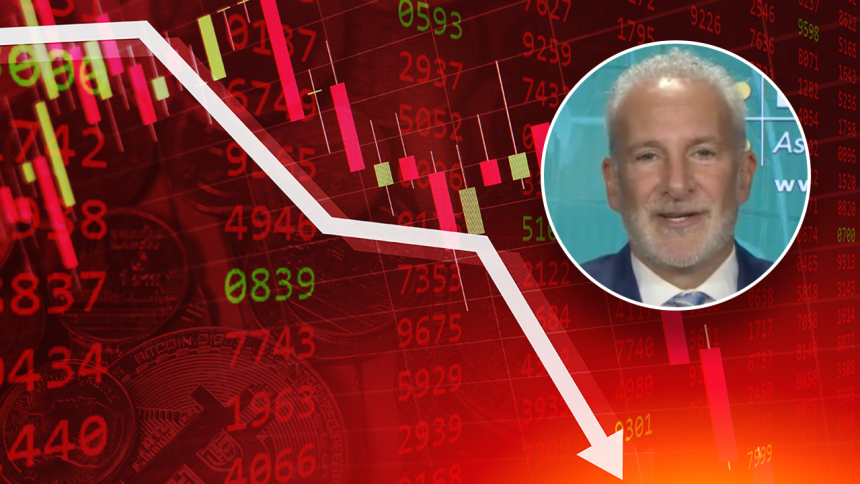Despite the Federal Reserve’s attempt to combat crippling inflation, one expert argued the latest jobs report and inflation data indicate the central bank is “not making any progress” in achieving its target of 2% inflation.
“It shows that the Fed is not making any progress in its inflation fight because consumers keep spending and reducing their savings in spite of the rate hikes,” Euro Pacific Asset Management chief economist Peter Schiff told Fox News Digital.
“The rate hikes are supposed to reduce spending and increase savings. That’s how they bring down inflation. But nothing has worked, and so inflation is going to get worse.”
US ECONOMY ADDS 187,000 JOBS IN AUGUST WHILE UNEMPLOYMENT RATE UNEXPECTEDLY JUMPS
Among numerous sets of soft economic data, the personal consumption expenditures (PCE) index showed that consumer prices rose 0.2% from the previous month, according to the Labor Department. On an annual basis, prices climbed 3.3% — up from 3% the previous month, underscoring the challenge of taming high inflation.
Core prices, which strip out the more volatile measurements of food and energy, climbed 0.2% from the previous month and 4.2% from the previous year.
Other figures included in the report showed that consumer spending jumped 0.8% in July, compared to a 0.6% increase in June.
Schiff noted the PCE data was “significant” because of the “big spike in spending, but a very small gain in incomes.”
“The way consumers handled that was rating their savings. The savings rate plunged down to 3.5%. That’s a sign that the economy is weak because consumers need that rainy day fund because it’s raining. They’re having a hard time.”
KEY FED INFLATION GAUGE ACCELERATES TO 3.3% IN JULY AS HIGH PRICES PERSIST
In addition to Thursday’s PCE index, the Labor Department’s August jobs report was released on Friday. U.S. job growth continued at a moderate pace in August while the unemployment rate unexpectedly jumped – a sign that the labor market is finally cooling in the face of rising interest rates and chronic inflation.
Employers added 187,000 jobs in August, the U.S. Department of Labor said in its monthly payroll report released Friday, topping the 170,000 jobs forecast by Refinitiv economists.
At the same time, a separate report based on a survey of households offered a slightly different picture of the labor market. The report indicated that the unemployment rate climbed to 3.8% from 3.5% as the labor force participation rate rose to a nearly three-year high. It marked the highest jobless rate since February 2022 and the biggest increase since the early days of the COVID-19 pandemic.
The uptick in unemployment is a sign of weakness, according to Schiff.
Average hourly earnings — a key measure of inflation — increased 0.2% for the month and remain up 4.3% from the same time one year ago. Both figures came in under estimates, a welcome sign for the Federal Reserve, which Schiff said is “problematic” given the continued rise in prices.
WORKERS NOW DEMANDING NEARLY $80K TO START NEW JOB
The report also contained sharp downward revisions to job growth earlier this summer. Gains for June and July were revised down by a total of 110,000 jobs to a respective 105,000 and 157,000, the government said, suggesting that the labor market is weaker than it previously appeared.
Schiff pointed out the jobs report is “a continuation of what’s been going on all year.”
“This is the seventh consecutive downward revision to the prior month. And they’re not small revisions. They’re significant,” he stressed.
“If we’ve done something seven times in a row. It doesn’t seem very random because if these were random numbers, sometimes they’d be too high, sometimes they’d be too low. It’s difficult to toss heads seven times in a row. So if you toss it seven times in a row, maybe the coin is not fair, maybe it’s weighted heavier. And so I think that the Labor Department is biased in their assumptions, and they think the market is stronger than it is. And so they just assume more jobs were created. And when they get more data, they end up having to go back and lower it.”
Schiff predicted the August jobs number will be the “eighth consecutive time” the Labor Department readjusts its data.
“This is stagflation,” he said. “The economy is weakening, the labor market is weakening, but consumer prices are strengthening.”
Fed policymakers have indicated that they are closely watching the report for evidence the labor market is softening after more than a year of interest rate hikes.
The slowdown in hiring, coupled with the spike in unemployment and cooling wage growth, likely provides the U.S. central bank fodder to hit pause on its rate-hike campaign in September, and possibly November.
Schiff, however, argued the “proper response” from the Fed would be to continue with rate hikes, but pointed out that “significant spending cuts” are also needed.
In addition, Schiff believes the economy has “bottomed out” in headline CPI which is now rising again despite the Fed’s aggressive rate hike campaign.
“The Fed’s at 5.5%. They’re no closer to getting 2% inflation than when they had rates at zero. Meanwhile, the budget deficits are higher now than they were when rates were at zero. So the government is spending more instead of less. So nothing has worked, and the markets are completely wrong on their benign outlook for future inflation.”
Ultimately, Schiff says the Fed will likely announce another quarter or half point hike, but again emphasized the move will not “make a difference.”
“They already went from zero to 5.5%, and it hasn’t done anything. So what’s an extra quarter point or a half point? It’s nothing,” he said.
“We actually need much higher interest rates. The problem is we can’t afford them. So any interest rate high enough to fight inflation is too high for the markets. And in fact, not only does the Fed create a recession. But it creates a financial crisis, and that financial crisis will be considerably worse than the one we had in 2008,” he concluded.
FOX Business’ Megan Henney contributed to this report.
Read the full article here




